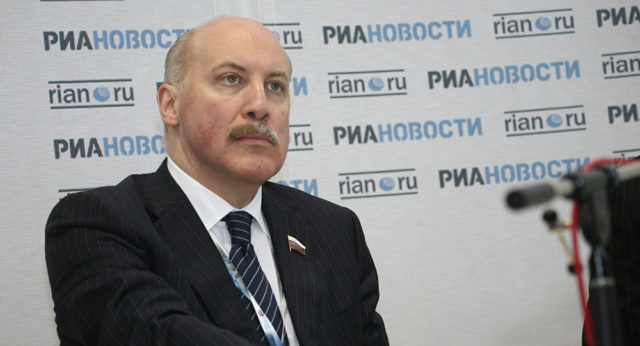
New Russian Ambassador in Minsk—More Polite and Likely More Effective
Publication: Eurasia Daily Monitor Volume: 16 Issue: 82
By:

During his brief tenure, the brash Russian ambassador to Minsk Mikhail Babich had repeatedly offended Belarusians and even President Alyaksandr Lukashenka. But his replacement by the more diplomatic Dmitry Mezentsev will not bring any fundamental change to Vladimir Putin’s overarching drive to absorb Belarus into the Russian Federation. Indeed, a month ago, the Kremlin leader was prepared to sacrifice his close friend Babich precisely to keep his integrationist plans regarding Belarus on track (see EDM, May 1). But what has occurred over the last month since his appointment, on April 30, suggests that Ambassador Mezentsev will prove to be an even more effective promoter of exactly the same Kremlin policies by depriving opponents of Moscow in Belarus and the West of a target for criticism and mobilization.
Mezentsev displayed his diplomatic skillfulness during an interview with Rossia-24 television at the end of May. Asked whether he would refer to the country of which Minsk is the capital as “Belorossia”—as Babich habitually did, to the delight of hardliners in Moscow but to the horror and anger of Belarusians in Belarus—the new ambassador said that “as of June 2, I will fly to my new workplace in the capital of the Republic of Belarus” (Vesti.ru, May 29). That charmed many Belarusians, encouraging local predictions that Mezentsev will present a “softer” approach to bilateral relations (Tut.by, May 30). Yet, this conclusion worried some Russians who had been pleased with Babich’s more assertive and even aggressive approach (NSN, June 2).
The new Russian envoy followed that up with an Izvestia interview in which he insisted that “there are no ‘black cats’ in Moscow and Minsk’s relations” and that integration can and must proceed on the basis of agreements reflecting the interests of both sides (Izvestia, June 3). He suggested compromise had been achieved (or soon would be) on, inter alia, question of compensation to Belarus for contaminated oil sent into its pipelines from Russia (News.ru, June 3) and Russian tax policies, which have infuriated Lukashenka because they cost him and his government enormous sums (Rossaprimavera.ru, June 1).
However, perhaps the most important message Mezentsev delivered in these two places and repeatedly in other outlets over the past month is that the Russian Federation and Belarus must integrate on the basis of the Union State and each must take cognizance of the views and concerns of the other in this process. So while Mezentsev may have taken care to be more polite toward Belarusian officials and the Belarusian people than his immediate predecessor, there is absolutely no reason to think that his appointment represents any change in Moscow’s goals. Indeed, what appears to have happened with the change in Russian ambassadors is that Putin has recognized he will achieve more at lower cost with an ambassador who does not offend his hosts so frequently.
And because Russian policy remains unchanged, Moscow commentators are saying that he will soon run into difficulties in Minsk. Specifically, the Belarusian government is more concerned about underlying issues of sovereignty, control and economic assistance than about whatever changed atmospherics a new ambassador may provide (Gazeta.ru, June 2). Moreover, these same commentators are pointing out something Belarusians and the West appear to have missed: Mezentsev is far closer to Putin than Babich ever was. He rose to prominence in St. Petersburg alongside Putin, and he has worked with the Kremlin leader since that time, especially on the critical issue of promoting Russian relations with China. Consequently, they argue, Mezentsev will be just as much or even more Putin’s man in Minsk as well as just as much or even more committed to Putin’s expansionist agenda (Gazeta.ru, June 2).
The difference in tone, however, may not be the only thing changing in relations between Moscow and Minsk. On May 30, Lukashenka personally took a step that may alter how and where disagreements between the two governments are negotiated and settled. He named Vladimir Semashko, his ambassador to Moscow, deputy prime minister, with responsibilities for Belarusian participation in the Union State and relations with Moscow (President.gov.by, May 30). Semashko was a deputy prime minister before; regaining this title will give him added clout and may make him Belarus’s point man in talks with Russia.
Given its timing, this may be Lukashenka’s way of signaling to the Kremlin that he does not intend to tolerate any unwelcome actions by the incoming Russian ambassador and wants to have another channel available for talks with the Kremlin besides one-on-one discussions. As a result, Mezentsev may, like most ambassadors, largely disappear from public now that he is in place. And yet, as some in Belarus are suggesting, it could instead mean that he will be freer to act (if not to speak). Thus, behind Mezentsev’s smiling face and softer words, Russian efforts to integrate Belarus might, in fact, increase far more rapidly than they did under Babich. That is clearly what many in Moscow hope for (Materik, May 31) and what many in Minsk have good reason to fear (Belsat, May 31; Belorusskiy Partisan, May 30).



